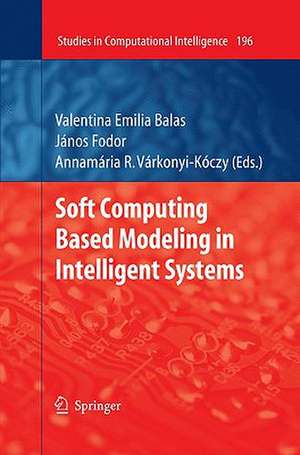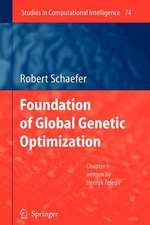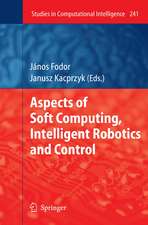Soft Computing Based Modeling in Intelligent Systems: Studies in Computational Intelligence, cartea 196
Editat de Valentina Emilia Balas, János Fodor, Annamária R. Várkonyi-Kóczyen Limba Engleză Hardback – 23 mar 2009
| Toate formatele și edițiile | Preț | Express |
|---|---|---|
| Paperback (1) | 636.45 lei 43-57 zile | |
| Springer Berlin, Heidelberg – 28 oct 2010 | 636.45 lei 43-57 zile | |
| Hardback (1) | 642.68 lei 43-57 zile | |
| Springer Berlin, Heidelberg – 23 mar 2009 | 642.68 lei 43-57 zile |
Din seria Studies in Computational Intelligence
- 20%
 Preț: 449.37 lei
Preț: 449.37 lei - 20%
 Preț: 1158.26 lei
Preț: 1158.26 lei - 20%
 Preț: 986.66 lei
Preț: 986.66 lei - 20%
 Preț: 1452.76 lei
Preț: 1452.76 lei - 20%
 Preț: 168.78 lei
Preț: 168.78 lei - 18%
 Preț: 1112.30 lei
Preț: 1112.30 lei - 20%
 Preț: 565.38 lei
Preț: 565.38 lei - 20%
 Preț: 649.28 lei
Preț: 649.28 lei - 20%
 Preț: 1047.73 lei
Preț: 1047.73 lei - 20%
 Preț: 1578.96 lei
Preț: 1578.96 lei - 20%
 Preț: 643.50 lei
Preț: 643.50 lei - 20%
 Preț: 657.49 lei
Preț: 657.49 lei - 20%
 Preț: 993.28 lei
Preț: 993.28 lei - 20%
 Preț: 990.80 lei
Preț: 990.80 lei - 20%
 Preț: 989.96 lei
Preț: 989.96 lei - 20%
 Preț: 1165.69 lei
Preț: 1165.69 lei - 20%
 Preț: 1444.52 lei
Preț: 1444.52 lei - 20%
 Preț: 1041.96 lei
Preț: 1041.96 lei - 20%
 Preț: 1047.73 lei
Preț: 1047.73 lei - 20%
 Preț: 1046.06 lei
Preț: 1046.06 lei - 18%
 Preț: 2500.50 lei
Preț: 2500.50 lei - 20%
 Preț: 989.13 lei
Preț: 989.13 lei - 20%
 Preț: 1165.69 lei
Preț: 1165.69 lei - 20%
 Preț: 1164.05 lei
Preț: 1164.05 lei - 20%
 Preț: 1042.79 lei
Preț: 1042.79 lei - 20%
 Preț: 1460.19 lei
Preț: 1460.19 lei - 18%
 Preț: 1403.52 lei
Preț: 1403.52 lei - 18%
 Preț: 1124.92 lei
Preț: 1124.92 lei - 20%
 Preț: 1039.47 lei
Preț: 1039.47 lei - 20%
 Preț: 1008.11 lei
Preț: 1008.11 lei - 20%
 Preț: 1045.25 lei
Preț: 1045.25 lei - 20%
 Preț: 1275.42 lei
Preț: 1275.42 lei - 20%
 Preț: 1040.32 lei
Preț: 1040.32 lei - 20%
 Preț: 988.32 lei
Preț: 988.32 lei - 20%
 Preț: 1169.79 lei
Preț: 1169.79 lei - 20%
 Preț: 1162.37 lei
Preț: 1162.37 lei - 20%
 Preț: 1059.26 lei
Preț: 1059.26 lei - 20%
 Preț: 1164.05 lei
Preț: 1164.05 lei - 20%
 Preț: 1166.52 lei
Preț: 1166.52 lei - 20%
 Preț: 1459.38 lei
Preț: 1459.38 lei - 18%
 Preț: 1005.74 lei
Preț: 1005.74 lei - 20%
 Preț: 997.38 lei
Preț: 997.38 lei - 20%
 Preț: 1055.94 lei
Preț: 1055.94 lei - 20%
 Preț: 1284.47 lei
Preț: 1284.47 lei - 20%
 Preț: 994.08 lei
Preț: 994.08 lei - 20%
 Preț: 1048.72 lei
Preț: 1048.72 lei - 20%
 Preț: 1066.02 lei
Preț: 1066.02 lei - 20%
 Preț: 943.78 lei
Preț: 943.78 lei - 20%
 Preț: 1173.10 lei
Preț: 1173.10 lei - 20%
 Preț: 1457.72 lei
Preț: 1457.72 lei
Preț: 642.68 lei
Preț vechi: 756.09 lei
-15% Nou
Puncte Express: 964
Preț estimativ în valută:
122.98€ • 128.72$ • 102.36£
122.98€ • 128.72$ • 102.36£
Carte tipărită la comandă
Livrare economică 31 martie-14 aprilie
Preluare comenzi: 021 569.72.76
Specificații
ISBN-13: 9783642004476
ISBN-10: 3642004474
Pagini: 216
Ilustrații: IX, 205 p.
Dimensiuni: 155 x 235 x 25 mm
Greutate: 0.48 kg
Ediția:2009
Editura: Springer Berlin, Heidelberg
Colecția Springer
Seria Studies in Computational Intelligence
Locul publicării:Berlin, Heidelberg, Germany
ISBN-10: 3642004474
Pagini: 216
Ilustrații: IX, 205 p.
Dimensiuni: 155 x 235 x 25 mm
Greutate: 0.48 kg
Ediția:2009
Editura: Springer Berlin, Heidelberg
Colecția Springer
Seria Studies in Computational Intelligence
Locul publicării:Berlin, Heidelberg, Germany
Public țintă
ResearchCuprins
Soft Computing Methods for Global, Local and Personalized Modeling and Applications in Bioinformatics.- Orthosymmetry Aspects of Aggregation Functions.- MOGA Design of Neural Network Predictors of Inside Temperature in Public Buildings.- Model Based Anytime Soft Computing Approaches in Engineering Applications.- A Multi-structure Modeling Methodology.- The Generalized Dombi Operator Family and the Multiplicative Utility Function.- Multi-channel Representations of Max-Plus Algebra Based Wavelet Transform and Their Application to Video Coding.- The Fuzzy-Interpolative Methodology.- Interpolative-Type Control Solutions.
Textul de pe ultima copertă
The book includes soft computing implementations of intelligent systems models. The recent popularity of fuzzy systems, neural networks and evolutionary computation, considered as related in AI, are now widely used to build intelligent systems. Professor Lotfi A. Zadeh has suggested the term "Soft Computing" for all new techniques working in these new areas of AI. Soft Computing techniques are tolerant to imprecision, uncertainty and partial truth. Due to the large variety and complexity of the domain, the constituting methods of Soft Computing are not competing for a comprehensive ultimate solution. Instead they are complementing each other, for dedicated solutions adapted to each specific problem. Hundreds of concrete applications are already available in many domains. Model based approaches offer a very challenging way to integrate a priori knowledge into procedures. Due to their flexibility, robustness, and easy interpretability, the soft computing applications will continue to have an exceptional role in our technologies.
Caracteristici
Contains the extended works originally presented at the IEEE International Workshop SOFA 2005 Includes supplementary material: sn.pub/extras






























